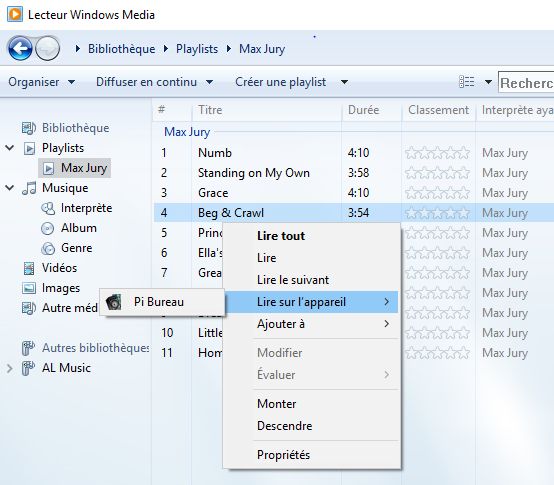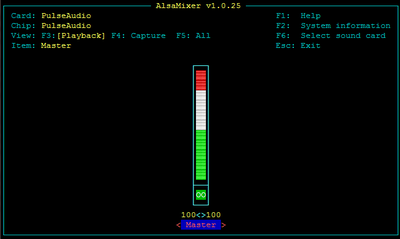

- #Gmediarender audiosink audiodevice drivers
- #Gmediarender audiosink audiodevice driver
- #Gmediarender audiosink audiodevice code
+ deviceparam-gstout-audiodevicealsadevice. You might need to enclose the string in single or double quotes. +++ feeds/packages/multimedia/gmediarender/files/nfig 11:09:43.520258640 +.

Gstout-audiopipe = audioresample quality=10 ! audio/x-raw, rate=XXX ! alsasink device=YYY If it just appends it to the pipeline you could include resampling as part of the string, like this: Note: Adjustments to the volume will change the volume of this audio stream, not the global volume. Values outside this range will be clamped. The volume is scaled linearly from 0.0 (silence) to 1.0 (full volume).
#Gmediarender audiosink audiodevice code
It would depend on what the code does with the string you supply it. void QAudioSink:: setVolume ( qreal volume) Sets the output volume to volume. According to the code that Pavel pointed to, gstout-audiopipe takes a string. The other possibility is to supply pipeline elements that perform resampling to Gmediarenderer. Pavel can chime in on that kind of scheme. Gmediarenderer would send audio to the resampler plugin instead of to the RME card directly. You could configure that to forward audio to the alsa loopback device, and then use alsaloop to send it on to the card.

One approach might be to set up a custom alsa plugin that does resampling to the fixed rate that you need for your RME card. So if I am understanding this correctly, the Gstreamer pipeline in GMediaRenderer throws an error when there is a file played that is not at the rate of the alsasink because the sink rate is fixed? Hi Bob, you can always PM me to get my attention faster. bcm2835 ALSA Default Audio Device sysdefault:CARDALSA bcm2835 ALSA. But it's coding in C and learning the quite complex GST API. Check what the sysdefault audio sink is that GMediaRenderer is going to use. Such feature would be possible to add to gmediarender as it works with the gstreamer internals directly - handling some rate change gstreamer message or something like that. I am not aware of any way to configure the pipeline to call an external action at samplerate change. I want to use Gmediarenderer with my new Logitech USB DAC, without using PulseAudio, if possible.
#Gmediarender audiosink audiodevice drivers
Charlie Laub is the gst guru here.Īs of switching the rate on demand - vast majority of alsa drivers does that, based on required hw_params by the player app. After several hours, I'm asking for help. You would have to play with the params to get correct format, it's always a bit of fight in gstreamer.

The sink pipeline should be configurable with -gstout-audiopipe. But I am not sure your locally-defined "default" device is being used as you configure device "sysdefault" with -gstout-audiodevice=sysdefault - see. Therefore you have the card fixed at 96k and want to resample everything to 96k.
#Gmediarender audiosink audiodevice driver
IIUC the RME card does not switch samplerate automatically in the hdspe driver due to some internal complexities, and the rate must be switched manually via alsa controls. Should this work: gst-play-1.0 sample.OK. Running aplay CantinaBand3.wav -D default:CARD=Headphones inside the container works just fine, however gstreamer and/or gmrender does not. options allow the user to configure where the sound output from gmediarender is sent.
gstout-audiodeviceGmrender | streaming stopped, reason not-negotiated (-4)) One way to generate a UUID is to create a UUID once by running the uuidgen tool. libs/gst/base/gstbasesrc.c(3127): gst_base_src_loop (): /GstPlayBin:play/GstURIDecodeBin:uridecodebin0/GstSoupHTTPSrc:source: Gmrender | ERROR source: Error: Internal data stream error. gst-libs/gst/audio/gstaudiobasesink.c(1191): gst_audio_base_sink_preroll (): /GstPlayBin:play/GstPlaySink:playsink/GstBin:abin/GstAutoAudioSink:audiosink/GstOpenALSink:audiosink-actual-sink-openal: to use the following as the identifier startup parameters to the binary gmediarender: -gstout-audiosinkalsasink -gstout-audiodeviceplughw:2,0. Gmrender | ERROR audiosink-actual-sink-openal: Error: The stream is in the wrong format. ext/openal/gstopenalsink.c(858): gst_openal_sink_prepare (): /GstPlayBin:play/GstPlaySink:playsink/GstBin:abin/GstAutoAudioSink:audiosink/GstOpenALSink:audiosink-actual-sink-openal: DAEMONUSER ' pi:audio ' Device name as it will be advertised to and shown in the UPnP controller UI. On the Raspberry Pi, let's use the default user. END INIT INFO User and group the daemon will be running as. Gmrender | ERROR audiosink-actual-sink-openal: Error: Unable to prepare device. Short-Description: Start GMediaRender at boot time Description: Start GMediaRender at boot time. Gmrender | AL lib: (EE) ALCplaybackAlsa_reset: snd_pcm_hw_params(self->pcmHandle, hp) failed: File descriptor in bad state


 0 kommentar(er)
0 kommentar(er)
